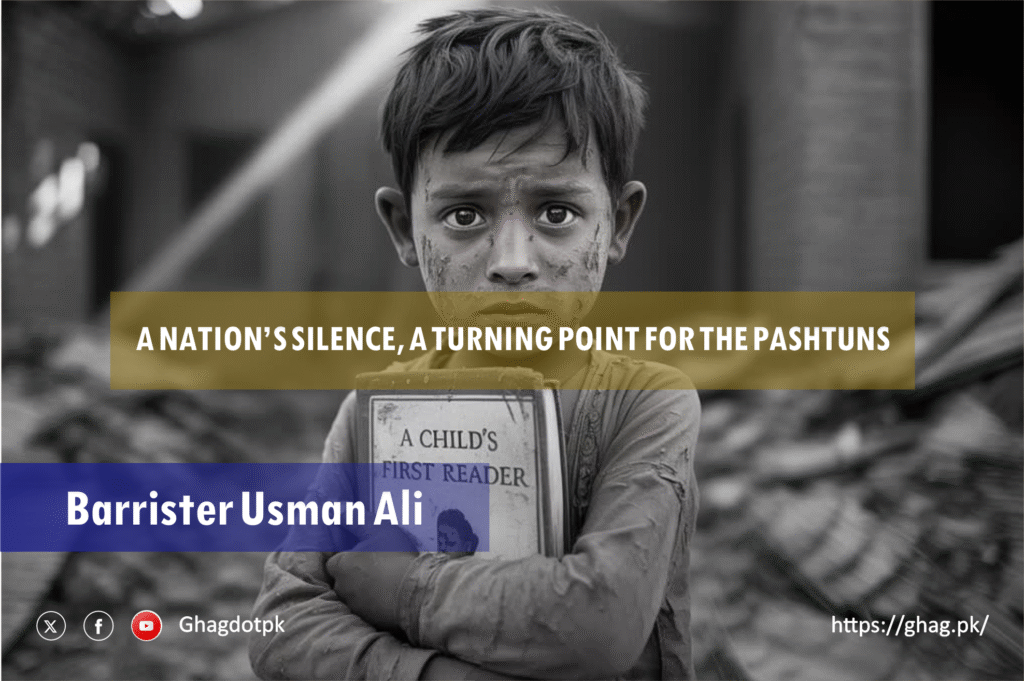By Barrister Usman Ali
For decades, the unfortunate land of Khyber Pakhtunkhwa has continued to burn , a fire that refuses to die out. Once again, terrorists have silenced a powerful voice of peace, love, reason, and wisdom , Shaheed Maulana Khan Zaib. He was a progressive religious scholar and a principled political worker who dedicated his entire life to the cause of truth, justice, and enlightenment.
In sermons echoing across dusty mosques and street corners, Maulana Khan Zaib often reminded his people, “Peace is not passivity , it is resistance through wisdom.” He wasn’t just a scholar behind a pulpit. He was seen helping rebuild a burnt-down madrassa with his own hands, speaking equally to elders and teenagers, pushing them toward literacy, reason, and reform.
His assassination is not merely a personal tragedy or a local incident, it is another painful chapter in the systematic elimination of peaceful and reformist Pashtun leadership. His martyrdom reminds us of those great individuals who stood firm against extremism, repression, and uncertainty, choosing instead the path of peace, democracy, and progress.
There is a long list of such peace-loving Pashtun leaders and scholars who were killed simply because of their ideas, resistance, and message of peace. Many of them fearlessly raised their voices against state oppression, religious extremism, and violent ideologies , and paid a heavy price. Their only “crime” was that they spoke of reconciliation, knowledge, and justice, even in an atmosphere of fear.
It is deeply unfortunate that the collective dream of the Pashtuns remains unfulfilled. History bears witness that despite their courage, culture, and sacrifices, the Pashtuns have for decades been thrown into conflicts that were never their own.
Especially during the Afghan war and the subsequent wave of extremism, the Pashtuns were not only victims of state policies but were also repeatedly used by international powers. From the Pashtuns of Pakistan to the oppressed Pashtuns of Afghanistan, their blood has repeatedly been sacrificed for agendas that only served those very forces who never prioritized their future.
But the harshest truth is that this downfall has also been enabled by the Pashtuns themselves , through silence, emotional attachment, and ignorance. In the name of honour, tradition, or religious fervour, they followed paths that ultimately led them into darkness, poverty, and backwardness. While other nations race ahead with science and technology, Pashtun regions still languish without basic services or functioning schools , trapped in systemic neglect.
Today, the situation is more dire than ever. The younger generation ,the future of any nation , is lost in confusion. Where they should be drawn to knowledge, awareness, and constructive action, they are instead immersed in TikTok, rumours, and superficial digital content. Their presence on social media may be loud, but it is often devoid of reason, directionless, and intellectually hollow. Personality worship, endless arguments, and an escape from truth have become commonplace.
All of this is the result of a vacuum that has emerged in the realm of leadership. Pashtun society faces a profound leadership crisis , not just political, but intellectual, moral, and educational in nature. Existing leadership often appears reactive, emotional, and engaged in short-lived slogan politics. There is no long-term vision for development, education, or public welfare.
Over the years, Pashtuns have placed their hopes in various leaders and followed them, but many of those leaders offered nothing beyond personal agendas or hollow, performative rhetoric , pushing the nation deeper into despair.
True leadership will be that which works for the rights, progress, and representation of Pashtuns within the system, not through confrontation with it. We need leaders who are genuinely patriotic, committed to the public good, and who speak with reason, not rage.
Such leadership must emerge from within , individuals grounded in reality, connected to their heritage, yet fluent in the language of the modern world. People who believe in education, equality, the rule of law, and democratic principles. Those who advocate for peace, reform, and institution-building. Those who give youth not slogans, but vision; not outrage, but awareness.
But leadership alone is not enough. The people must awaken too. This awakening must begin with the youth. They must return to reading, reflection, and dialogue. They must revisit their history , not only its tales of warfare, but also its struggles for education, equality, and justice. They must learn the ethics of disagreement, the art of organizing, and the skill of turning dreams into reality.
Pashtun society must now build institutions that produce not only soldiers, but thinkers, scientists, educators, and social reformers. We must revive literature and poetry, liberate media and education, and awaken critical consciousness in the youth. We must abandon blind imitation and redefine our concept of “honour” , honour not rooted in noise, but in service; not in slogans, but in insight.
This is not a dream , it is an achievable reality. Many nations have emerged from the ashes of war, defeat, and disaster to rebuild themselves. The Pashtuns can do the same, if they are willing to transform their attitudes, priorities, and patterns of thought. If they are willing to confront truth, embrace accountability, and feel collective responsibility.
Let Maulana Khan Zaib’s martyrdom not be another fading headline. Let it spark the awakening of a silenced generation. His life proved that religion and progress are not opposites, that identity and reform can coexist. His legacy doesn’t demand pity , it demands action.
Perhaps one day, Pashtuns will stop being used as pawns and finally take the board. Perhaps, even after all this, we will learn. And until then, hope , fragile, flickering , still holds the line. Because it always has.






